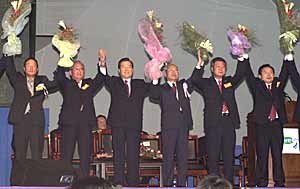Kim pledges drastic overhaul of nat'l security law at MDP convention
Kim pledges drastic overhaul of nat'l security law at MDP convention
Posted August. 30, 2000 20:17,

The ruling Millennium Democratic Party (MDP) has formed a new party leadership with the election of seven members to its supreme council in a national convention on August 30. The gathering was attended by President Kim Dae-Jung and over 9,000 delegates. President Kim, who also heads the ruling party, appointed Rep. Suh Young-Hoon, present party chairman, the "representative supreme councilor," who will lead the party for the next two years. In a secret vote with 4-man plural entry, Rep. Hahn Hwa-Kap ranked first by garnering 4,993 or 57.3 percent of the
total number of ballots. Rep. Lee In-Je finished second with 3,862 ballots, followed by Kim Choong-Kwon, Park Sang-Cheon, Chung Dong-Young, Kim Keun-Tae and Chyung Dai-Chul. The voting was participated in by 8,710 or 92 percent of the delegates.
President Kim appointed party chairman Suh Young-Hoon and Kwon Roh-Kap ex officio supreme council members. In a congratulatory address, President Kim said that the MDP has achieved much during the first half of his term in office in terms of human rights protection, overcoming the exchange liquidity crunch, the promotion of information technology and opening a new era in inter-Korean relations. Thanks to these accomplishments, this government has an approval rating of approximately 70 percent, Kim asserted, calling upon the delegates to do their utmost to meet the people`s expectations with tenacity and devotion. The president stressed that the MDP must achieve five tasks, including the realization of a human rights state and the creation of a democratic nation on the basis of the three policy goals of democracy, a market economy and productive welfare. For short-term policies, Kim proposed the enactment of a human rights bill and an anti-corruption bill, the drastic overhaul of the National Security Law and the implementation of reforms in the four major sectors. He also suggested further development of knowledge and information-based industries, national reconciliation and the beginning of peaceful coexistence between the two Koreas.







